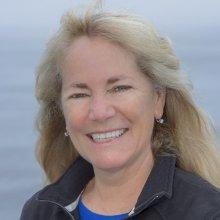
Jan Roletto
Tell us about your work/research. What kinds of things do you do?
My “day job” is the Research Coordinator for Greater Farallones National Marine Sanctuary (GFNMS), where I work to promote the sanctuary as a sentinel site for research and monitoring and encourage partnerships from academia, non-profit research institutions, as well as other federal and state marine and estuarine ecosystem management agencies. The government alone cannot sustain healthy oceans. It takes partnerships with other research institutions and agencies, stewardship and community involvement, in order to combat today’s pressures on our marine ecosystems. At GFNMS, we have long-term monitoring projects that involve data collection and analyses conducted by students and citizen-scientists. I believe that a strong-citizen science program not only provides information for management, but also promotes stewardship, and thus increases protection of our oceans.
What sparked your initial interest in your career?
My mom and I would watch the Apollo space launches and moon landings together and that sparked my interest in science, investigation, and solving wildlife mysteries through exploration and analysis. I always loved the connection I felt when studying the behavior of captive and free-roaming wildlife. Watching wild animals interact with as little interruption as possible, allowed me to peek into their world.
Who influenced you or encouraged you the most?
I found this career on my own. I started out as a ceramic major. I soon realized I also had to be a businessperson, in order to be successful. I knew I was not going to be good at running my own business, so I searched for another major. An early undergraduate course was the study of the behavior of captive wild animals and my project was to record daytime behaviors of harbor seals in the wild and at the Zoo. I designed and implemented the project on my own, setting me off in a totally different direction for the rest of my life.
What element of your work/study do you think is the most fascinating?
Every time I provide new information to solve a management issue (for example how to reduce wildlife disturbance, or the best way to restore a habitat after an oil spill), I am rejuvenated in my work. Some of my work relates to developing new regulations that will increase the chances of a species or habitat to adapt to climate change. My research often provides the pieces of the ecosystem puzzle. By mapping and quantifying deep-sea corals and sponges, we can identify areas of the ocean floor that needs additional protection from ocean acidification, pollutants, and crushing from bottom contact fishing gear.
What other jobs led you to your current career?
My first job as a marine biologist was the Curator at The Marine Mammal Center, a marine mammal wildlife rehabilitation facility, in northern California.
What are your degrees and certifications?
Bachelor of Arts and Master of Arts in Marine Biology
Associate of Science in Administration of Justice
What are your hobbies?
I enjoy skiing, SCUBA diving, cycling, photography, and making wine with my husband.
What advice would you give to someone who wants to have a career like yours?
Learn the tools of the trade like GIS, biometry, database programming, and grant writing. Learn to love to write and communicate scientific findings to the general public. It’s a competitive field, so be ready to volunteer and work as an intern. Volunteer to gain experience working in the field, as well as working in the office to process and analyze the data collected in the field. For every hour you work in the field about another four to five hours of work is needed to prepare for the fieldwork and afterward to analyze, interpret and present your data.
How did you get involved in the Nautilus Exploration Program? How did you get on the ship?
I work for NOAA, through the National Ocean Service, Office of National Marine Sanctuaries. This will be my fourth cruise on board E/V Nautilus. Together we have explored shipwrecks, deep canyons, found amazing coral and sponge habitats, and discovered new species. I am thrilled and very fortunate to be a co-Lead Scientist on this cruise.
Expeditions
Jan participated in the following Ocean Exploration Trust expeditions:
